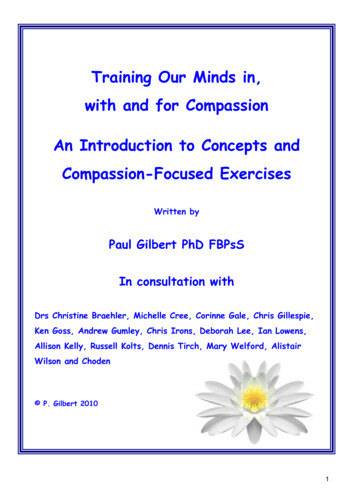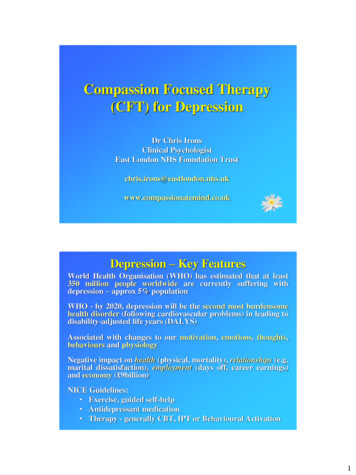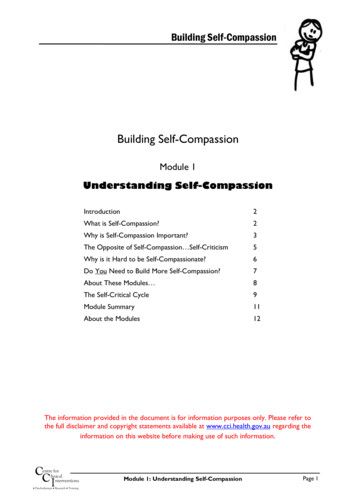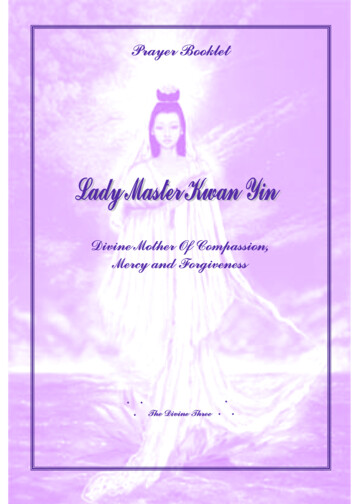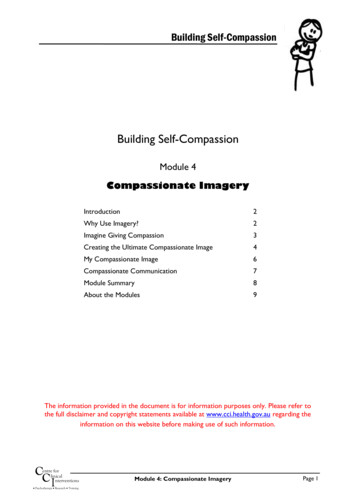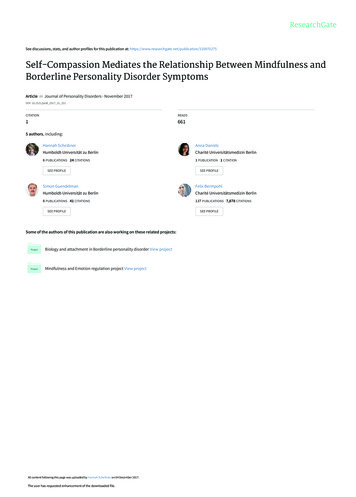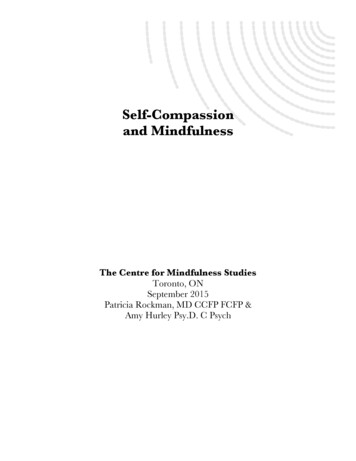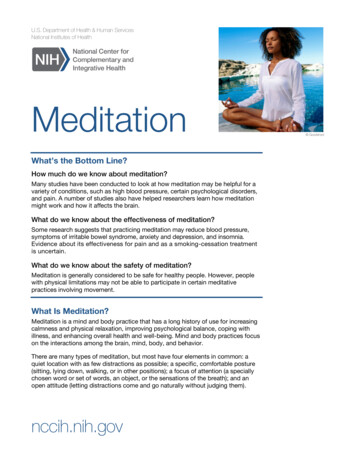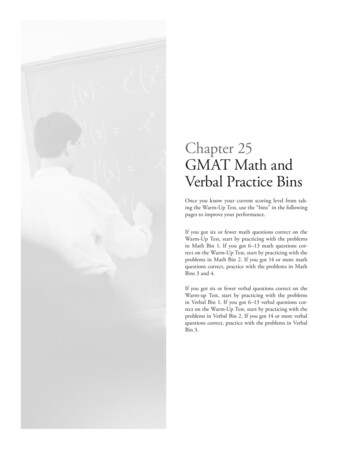
Transcription
Practicing)Mindf-lness)&)Compassion)
The Greater Good Science Center!The Science of a Meaningful sts,!and!more!at!greatergood.berkeley.edu!Events: ,tude!Journal!(Thnx4.org)!Books:!!Born to Be Good, The Compassionate Ins nct, Raising Happiness, Are We Born Racist?!Practicing)Mindf-lness)&)Compassion)
Practicing)Mindf-lness)&)Compassion)
Our Co9Sponsors Orange TreeGrey Logotypematch Pantone 716Cmatch C52 M43 Y41 K7For usage permission, approvals orother digital formats, contact:Lee HwangThe Quality of Life passion)
Our Partners icing)Mindf-lness)&)Compassion)
Goals and Flow of the Day ! The!Science!of!Mindfulness!and!Compassion! Trainings!and!Prac,ces! df-lness)&)Compassion)
Practicing)Mindf-lness)&)Compassion)
Mindfulness and Compassion:Similarities and DifferencesKristin Neff, Ph.D.University of Texas, ndf-lness)&)Compassion)
What is Compassion?Concern for the alleviation of sufferingof sentient beings (self and others)Practicing)Mindf-lness)&)Compassion)
Three Components ofCompassion for Self or OthersPracticing)Mindf-lness)&)Compassion)
Mindfulness Requires noticing the suffering of self/otherswithout avoidance or aversionPracticing)Mindf-lness)&)Compassion)
Kindness Treating self/others with care and understanding Involves active soothing and comfortingPracticing)Mindf-lness)&)Compassion)
Common Humanity Seeing the experience of self/others as part oflarger human experiencePracticing)Mindf-lness)&)Compassion)
What is the Difference BetweenMindfulness and Compassion?Depends on how you define mindfulness!Practicing)Mindf-lness)&)Compassion)
Common Definition of Mindfulness:Paying attention to present momentexperience without judgmentPracticing)Mindf-lness)&)Compassion)
Can be used as umbrella term for the dharmaor contemplative practice more generallyPracticing)Mindf-lness)&)Compassion)
Mm1m2m3Practicing)Mindf-lness)&)Compassion)m4
Four Aspects of M (Umbrella of Mindfulness) m1: Paying attention to experience in thepresent momentPracticing)Mindf-lness)&)Compassion)
Four Aspects of M (Umbrella of Mindfulness) m1: Paying attention to experience in thepresent moment m2: Relating to experience without judgment orresistance (mindfulness m1/m2)Practicing)Mindf-lness)&)Compassion)
Four Aspects of M (Umbrella of Mindfulness) m1: Paying attention to experience in thepresent moment m2: Relating to experience without judgment orresistance (mindfulness m1/m2) m3: Relating to the experiencer with the desire toalleviate suffering (compassion)Practicing)Mindf-lness)&)Compassion)
Four Aspects of M (Umbrella of Mindfulness) m1: Paying attention to experience in thepresent moment m2: Relating to experience without judgment orresistance (mindfulness m1/m2) m3: Relating to the experiencer with the desire toalleviate suffering (compassion) m4: Understanding the nature of both experienceand the experiencer (wisdom)Practicing)Mindf-lness)&)Compassion)
Four Aspects of M (Umbrella of Mindfulness) m1: Paying attention to experience in the presentmoment m2: Relating to experience without judgment orresistance (mindfulness m1/m2) m3: Relating to the experiencer with the desire toalleviate suffering (compassion) m4: Understanding the nature of both experienceand the experiencer (wisdom) Four aspects are cumulative and build on eachother m1 m2 m3 m4Practicing)Mindf-lness)&)Compassion)
Four Aspects of M (Umbrella of Mindfulness) It is important to understand differences betweenm’s for researchPracticing)Mindf-lness)&)Compassion)
Four Aspects of M (Umbrella of Mindfulness) It is important to understand differences betweenm’s for research! Self-report measures! Physiological differences! Brain functionPracticing)Mindf-lness)&)Compassion)
Four Aspects of M (Umbrella of Mindfulness) It is important to understand differences betweenm’s for trainingPracticing)Mindf-lness)&)Compassion)
Four Aspects of M (Umbrella of Mindfulness) It is important to understand differences betweenm’s for training! All four aspects may spontaneously unfold,especially among long-term practicionersPracticing)Mindf-lness)&)Compassion)
Four Aspects of M (Umbrella of Mindfulness) It is important to understand differences betweenm’s for training! All four aspects may spontaneously unfold! More direct training is sometimes needed, andthere are specific practices for each “m”Practicing)Mindf-lness)&)Compassion)
Four aspects of M (Umbrella of Mindfulness) It is important to understand differences betweenm’s for training! All four aspects may spontaneously unfold,especially among long-term practitioners! More direct training is sometimes needed, andthere are specific practices for each “m”! Training in compassion for oneself probablymost neededPracticing)Mindf-lness)&)Compassion)
Four aspects of M (Umbrella of Mindfulness) It is important to understand differences betweenm’s for training! All four aspects may spontaneously unfold,especially among long-term practitioners! More direct training is sometimes needed, andthere are specific practices for each “m”! Training in compassion for oneself probablymost needed" MBSR and MBCT focus mainly on teaching m1/m2,teach self-compassion implicitlyPracticing)Mindf-lness)&)Compassion)
Mindful Self-Compassion Program(created by Chris Germer and Kristin Neff) Modeled on MBSR, designed as a sister program Focuses primarily on teaching )
Mindful Self-Compassion Program Modeled on MBSR, designed as a sister program Focuses primarily on teaching self-compassion Appears to raise self-compassion 2 to 3 timesmore than MBSR, 4 to 5 times more than MBCT! Gains maintained for at least a yearPracticing)Mindf-lness)&)Compassion)
Mindful Self-Compassion Program Modeled on MBSR, designed as a sister program Focuses primarily on teaching self-compassion Appears to raise self-compassion 2 to 3 times morethan MBSR, 4 to 5 times more than MBCT! Gains maintained for at least a year For most, prior mindfulness training probably best,some may need self-compassion firstPracticing)Mindf-lness)&)Compassion)
Paradox of Mindfulness and Self-Compassion Mindfulness (m1/m2) accepts painful experiencewithout resistance, “being” with things as they are Compassion (m3) wishes the experiencer to befree from suffering, active self-soothingPracticing)Mindf-lness)&)Compassion)
Paradox of Mindfulness and Self-CompassionWe give ourselves compassion not to feel betterbut because we feel painPracticing)Mindf-lness)&)Compassion)
Paradox of Mindfulness and Self-CompassionSelf-compassion provides the emotional safety neededto mindfully open to our painPracticing)Mindf-lness)&)Compassion)
Mindfulness and Compassion:A Beautiful DancePracticing)Mindf-lness)&)Compassion)
Practicing)Mindf-lness)&)Compassion)
The Biological Landscape of Mindfulness& CompassionEmiliana Simon-Thomas, Ph.D.Science Director, Greater Good Science CenterUniversity of California, BerkeleyPracticing)Mindf-lness)&)Compassion)
Practicing)Mindf-lness)&)Compassion)
The!Vagus!Nerve!(m2/m3)! uring!outbreath!! al!posi,ve!emo,onal!tone! sion)
Oxytocin!(m2/m3)! bonding!(esp.!long!term)! )
ircuitry!(m3)! rs! !!Practicing)Mindf-lness)&)Compassion)
4)! Enables!emo,onal!resonance! ng)Mindf-lness)&)Compassion)
onal!Exper,se!(m3/m4)! Represents!meaning!of!emo,on!signals! ticing)Mindf-lness)&)Compassion)
nt/Awareness!(m1/m2)! Harnesses/channels!‘monkey!mind’! &)Compassion)
lance!(m2)!!Practicing)Mindf-lness)&)Compassion)
!Practicing)Mindf-lness)&)Compassion)
ness! ways !! ent/exper,se!pathways! cticing)Mindf-lness)&)Compassion)
Thanks!!Practicing)Mindf-lness)&)Compassion)
Practicing)Mindf-lness)&)Compassion)
Compassion Focused TherapyPaul Gilbert PhD, FBPsS, OBEMental Health Research Unit, Kingsway Hospital ellbeing.comPracticing)Mindf-lness)&)Compassion)
The Two Psychologies of CompassionCompassion can be defined in many ways:As a sensitivity to the suffering of self and others with adeep commitment to try to relieve and prevent itTwo different Psychologies– To approach, understand and (how to) engage withsuffering– To work to alleviate and prevent suffering –nurturingEach more complex that might at first seemPracticing)Mindf-lness)&)Compassion)
Compassion Focused Therapy: A Social MentalityCaring/HelpingGivingCare/Help Seeking/ReceivingSpecific Competenciese.g., attention empathySpecific Competenciese.g., openness responsiveFacilitators vs InhibitorsFacilitators vs InhibitorsPracticing)Mindf-lness)&)Compassion)
Compassion as FlowDifferent practices for eachOtherSelfSelfOtherSelfSelfEvidence that intentionally practicing each ofthese can have impacts on mental states and )
Why do we need Compassion?Life is HardPracticing)Mindf-lness)&)Compassion)
Compassion Begins With aReality Check We have gene-built evolved brains We all are born, grow decay and die – and aresusceptible to disease and injury We are socially shaped – from our geneexpressions to our sense of selfPracticing)Mindf-lness)&)Compassion)
Compassion:Challenges of Our Evolved Brainand theDistressed MindPracticing)Mindf-lness)&)Compassion)
Need compassion for a very tricky brainSources of behaviourNew Brain: Imagination,Planning, Rumination, IntegrationOld Brain: Emotions, Motives,Relationship n)
Need compassion for a very tricky brainSources of behaviourMindful BrainNew Brain: Imagination,Planning, Rumination, IntegrationOld Brain: Emotions, Motives,Relationship )Compassion)
Need compassion for a very tricky brainSources of behaviourMindful BrainNew Brain: Imagination,Planning, Rumination, IntegrationOld Brain: Emotions, Motives,Relationship &)Compassion)
Compassion andEmotionsPracticing)Mindf-lness)&)Compassion)
Types of Affect Regulator SystemsContent, safe, connectedDrive, excite, vitalityNon-wanting/Affiliative anting, Protection andSafety-seekingActivating/inhibitingAnger, anxiety, disgustPracticing)Mindf-lness)&)Compassion)
Practicing)Mindf-lness)&)Compassion)
Types of Affect Regulator SystemsContent, safe, connectedDrive, excite, vitalityNon-wanting/Affiliative anting, Protection andSafety-seekingActivating/inhibitingAnger, anxiety, disgustPracticing)Mindf-lness)&)Compassion)
Practicing)Mindf-lness)&)Compassion)
Practicing)Mindf-lness)&)Compassion)
Practicing)Mindf-lness)&)Compassion)
Safeness,Affiliation and n)
Practicing)Mindf-lness)&)Compassion)
Practicing)Mindf-lness)&)Compassion)
Types of Affect Regulator SystemsContent, safe, connectedDrive, excite, vitalityNon-wanting/Affiliative anting, Protection andSafety-seekingActivating/inhibitingAnger, anxiety, disgustPracticing)Mindf-lness)&)Compassion)
Between self and othersSelf-to selfSelfto selfCalmsThreatAffiliative/Soothing120 Million year evolving system to regulate threat
Compassion andCaringPracticing)Mindf-lness)&)Compassion)
Showing we care
Caring-Compassionate MindWarmthWarmthATTRIBUTESSensitivityCare ompassion)Warmth
Caring-Compassionate MindSKILLS -TRAININGWarmthImageryAttentionATTRIBUTESCare BehaviourWarmth
Compassionate ness)&)Compassion)Behaviour
Practicing)Mindf-lness)&)Compassion)
Practicing)Mindf-lness)&)Compassion)
ConclusionHumans are capable of wonderful things, but also terriblethings. Very mixed mind – many seedsOur minds are really a mixed range of potential motives, waysof thinking and behaving – and we easily dissociate one state ofmind from anotherBy improving our understanding of the nature of compassion,it’s facilitators and inhibitors, both as a giver and receiver, wemay be better placed to cultivate the good in us. This could bethe focus for the next generationPracticing)Mindf-lness)&)Compassion)
Practicing)Mindf-lness)&)Compassion)
Mindfulness & CompassionShauna L. Shapiro, Ph.D.Santa Clara UniversityPracticing)Mindf-lness)&)Compassion)
Acknowledgments!Greater Good, Dacher Keltner, Jason Marsh!Jon Kabat-Zinn, Jack Kornfield, Tara Brach, Gary Schwartz, RogerWalsh, Coquelicot Gilland, Shinzen Young, Benedict and NancyFreedman!Practicing)Mindf-lness)&)Compassion)
Mindfulness Defined!“The awareness that arises out ofintentionally paying attention in an open,kind and discerning way.Shapiro & Carlson, 2006Practicing)Mindf-lness)&)Compassion)
Three Core Elements of ndf-lness)&)Compassion)
Intention!Your intentions set the stage for what ispossible. They remind you from momentto moment of why you are practicing Iused to think meditation practice was sopowerful that as long as you did it at all,you would see growth and change. Buttime has taught me that some kind ofpersonal vision is also necessary.What is your intention for being here?Practicing)Mindf-lness)&)Compassion)
The most important thing is toremember the most important thing"!Suzuki RoshiPracticing)Mindf-lness)&)Compassion)"
Attention! Present Moment Awareness! Monkey mind! Mindfulness practice tames andstabilizes the mind so we can seeclearly.!“An unstable mind is like anunstable camera; we get a fuzzypicture.” Christopher Germer!Practicing)Mindf-lness)&)Compassion)
"Attitude""How we pay attention"!!Practicing)Mindf-lness)&)Compassion)
Attitude!What we practice becomes tKindnessPatienceLetting ion)
NeuroplasticityOur repeated experience shapes our brain.Mindfulness practice increases grey matterdensity in areas of the brain associated withlearning, self-awareness, emotionalintelligence, interoception and compassion.(Lazar, 2005; Britta Hölzel, 2011)Cortical thickening correlated withexperience: The more you practice thestronger the cortex. (Lazar, 2005)Practicing)Mindf-lness)&)Compassion)
Does Mindfulness Practice IncreaseCompassion for Self and Other?!Research demonstratesmindfulness training increasescompassion for self and otherin physicians, medicalstudents, counselingpsychology students,undergraduates, psychologistsand other health careprofessionals.!!Shapiro, Jazzeri, Goldin, 2012!!Shapiro, Oman, et al, 2008!!Shapiro, Brown, Bielge, 2007!!Shapiro, Astin, et al, 2004!!Shapiro, Schwartz, Bonner, 1998!Practicing)Mindf-lness)&)Compassion)
How Does Mindfulness Cultivate Compassion?!1. What we practice becomes stronger!!2. Slowing down!3. Interdependence!4. Remembering our essential nature!Practicing)Mindf-lness)&)Compassion)
1. What We Practice Becomes Stronger!Practicing)Mindf-lness)&)Compassion)
2. Slowing Down!When we are hurried, stressed, scared we lose touch with ournatural compassion. Mindfulness helps us slow down, see clearlyand stay connected to our deepest values.Practicing)Mindf-lness)&)Compassion)
3. Mindfulness Helps Us See OurInterdependence!We are all cells in God’s bodyPracticing)Mindf-lness)&)Compassion)
4. Remembering Our Essential NatureA clinical example:Mindfulness for PTSD.Learning to welcome allof our experience withcompassion even theseemingly unforgiveable.Practicing)Mindf-lness)&)Compassion)
St. Francis and the SowGalway KinnellPracticing)Mindf-lness)&)Compassion)
Presence of Heart!Practicing)Mindf-lness)&)Compassion)
If you can sit quietly after difficult news If in financial downturns you remain perfectly calm If you see your neighbors travel to favorite places without atinge of jealousy If you can happily eat whatever is put on your plate If you can love everyone around you unconditionally If you can always find contentment just where you are You are probably Practicing)Mindf-lness)&)Compassion)
A Dog!!Practicing)Mindf-lness)&)Compassion)
Thank you for your kind attention.Practicing)Mindf-lness)&)Compassion)
Practicing)Mindf-lness)&)Compassion)
Practicing)Mindf-lness)&)Compassion)
Mindfulness-BasedChildbirth & Parenting (MBCP)Training the Mind, Body, and Heartfor Childbirth and BeyondNancy Bardacke, RN, CNM, MAUCSF Osher Center for Integrative MedicineUCSF School of ss)&)Compassion)
A Brief History" 1994 -- MBSR" 1998 -- Formal adaptation of MBSR into MBCP(in my living room)" 2007 -- UCSF Osher Center for Integrative Medicine" 70 classes in 15 years" More than 1,300 expectant parentsPracticing)Mindf-lness)&)Compassion)
Why Bring Mindfulnessto Expectant Families?" Pregnancy is stressful" Childbirth is stressful" Parenting is stressful" Being born is stressful!Practicing)Mindf-lness)&)Compassion)
“Gestation is the time when our nervous systems areunder construction and being wired for equanimityand stability or for hypersensitivity and vulnerabilityto the stressors of the world outside the womb ”Robin Karr-Morse with Meredith S. WileyScared Sick: The Role ofChildhood Trauma in Adult DiseasePracticing)Mindf-lness)&)Compassion)
Can Mindfulness Bring Benefit?Practicing)Mindf-lness)&)Compassion)
Perhaps " 9 week course x 3 hours" Daily home practice: 30 min/day6 days/week" Silent daylong retreat" Reunion after birthPracticing)Mindf-lness)&)Compassion)
Mindfulness Practices" Body Scan" Sitting Meditation" Yoga" Walking Meditation" Loving-kindness Practice" Mindfulness in daily lifePracticing)Mindf-lness)&)Compassion)
MBCP Practices" Mindful pain practices" Inquiry practice: fear" Mindful partner communication" Thread of mindful parenting" CommunityPracticing)Mindf-lness)&)Compassion)
MBCP Pilot Observational StudyDuncan and Bardacke, Journal of Child & Family Studies (2010)INCREASED:DECREASED:Positive emotionsNegative emotionsMindfulness attention/awarenessDepressive mood non-judgingPregnancy anxiety non-reactivityPracticing)Mindf-lness)&)Compassion)
PreliminaryQualitative Findings"Increased confidence and decreased stress/fear post MBCP"High use of mindfulness pain coping skills during childbirth"Mindfulness sustained in the postpartum period"Relationship benefits:""Attunement behaviors, increased couple intimacy"Common language, empathic connectionInterrupt intergenerational patterns of sufferingPracticing)Mindf-lness)&)Compassion)
The Heart of the MatterPracticing)Mindf-lness)&)Compassion)
Expanding MBCPCenteringPregnancy withMindfulness Skills, SFGHPracticing)Mindf-lness)&)Compassion)
More expansion " Future Research" PEARLS: Labor related pain" OPAL: Survey of MBCPalumni N 500" International Collaborations:UK, the Netherlands, Sweden,Hong Kong" Teacher Training / UCSDPracticing)Mindf-lness)&)Compassion)
It’s not about the birth Practicing)Mindf-lness)&)Compassion)
Practicing)Mindf-lness)&)Compassion)
Mindful Lawyering:Peacemaking and Healing throughCompassionRhonda V. Magee, J.D.University of San Francisco School of LawPracticing)Mindf-lness)&)Compassion)
An Opening Practice: S.T.O.P.Mindfulness isbeing more fully aliveto the unrepeatable moments of our lives,and acting from the wisdom that arisesfrom there.Practicing)Mindf-lness)&)Compassion)
The Mindfulness RevolutionPracticing)Mindf-lness)&)Compassion)
The Mindfulness Revolution:changing the “how” of conflicttransformation.Peacefulcontact withthe nExpandingskill ompassion)
It Means Opening Up the Law SchoolClassroom . and bringing the whole person back in.Practicing)Mindf-lness)&)Compassion)
Mindful Lawyers are More Compassionate Lawyers.The movement to transform law practice begins with:Mindfulness,Which supports:our own inner healing,compassionate self-developmentcommitments to heal andbring peace to the world.andPracticing)Mindf-lness)&)Compassion)
Mindful, Compassionate Lawyers are PsychologicallyFlexible and Can Help Others Become so:Excerpted from:Acceptance andCommitmentTherapy MadeSimple, Russ Harris,M.D. (2009)Practicing)Mindf-lness)&)Compassion)
“Contemplative Law”:Integrating Compassion, Peacemaking and HealingDeveloping Lawyers in Three Ways,through Three Windows: Intra-personal Inter-personal Inter-systemicPracticing)Mindf-lness)&)Compassion)
Window #1: Presence Leads to Self-healing.Compassionate self-care.Mindfulness-Based Practices have been shown tosignificantly reduce the stress of people in a widerange of fields.My own research and personal experience confirmthis finding: A full 97% of respondents so far reportfinding that contemplative practices help themmanage stress.Practicing)Mindf-lness)&)Compassion)
Window # 2: Compassionate Lawyering Creates NewPossibilities.Compassionate Relationship healingand conflict transformation.Mindfulness-Based Practices help transform conflictthrough compassion, supporting ethical, relationalhealing.Here again, 97% of respondents in my study self-reportthat these practices improve their relationships.Practicing)Mindf-lness)&)Compassion)
Window #3: Real change happens.Compassionate Re-Invention of Self, Practice andLaw Itself.Mindfulness transformsour understanding of who we are and reshapes ourwork.“It has helped me to see how interconnectedall of life is. I am beginning to view the lawprofession as one that can heal relationshipsinstead of one that is )
Mindful Conflict Management and Transformation:Compassionate Lawyers Working to Heal and Bring Peace to aBroken-hearted world.Practicing)Mindf-lness)&)Compassion)
Practicing)Mindf-lness)&)Compassion)
Sustaining Compassion in Health CareRobert McClure, LCSW, CEAPSharp HealthCarePracticing)Mindf-lness)&)Compassion)
The Center for Compassion and Altruism Research and EducaEon (CCARE) Stanford University School of Medicine!!!!!!Practicing)Mindf-lness)&)Compassion)
g)Mindf-lness)&)Compassion)
Burnout and Compassion FaEgue !!!!!!!!!!!!!Burnout and SaEsfacEon With Work9Life Balance Among US Physicians RelaEve to the General US PopulaEon!! reatest!risk.!The!conclusion:!burnout is more common among physicians least!one9third of nurses fa,gue!and!the!risk!of!commilng!medical errors,!and paEents are less saEsfied ion)
Compassion CulEvaEon Training (CCT) 2012 9!weekly!2!hour!mee,ngs! sions.! .! Compassion)
CCT Six Steps 1. Se\ling!and!Focusing!the!Mind!2. Loving!kindness!and!compassion!for!a!loved!one!3. !4. Embracing!shared!common!humanity!5. Cul,va,ng!compassion!for!others!6. Compassion)
Our Strategy Grow!organically! Bo\om!up! Word!of!mouth! )Compassion)
Common Humanity mpassion)
Practicing)Mindf-lness)&)Compassion)
You are a part of the deduc,ble!dona,on!Visit us at greatergood.berkeley.edu !Practicing)Mindf-lness)&)Compassion)
Thank You! Practicing)Mindf-lness)&)Compassion)
Practicing)Mindf-lness)&)Compassion)
Mindful Brain . Practicing)Mindf-lness)&)Compassion) Sources of behaviour Old Brain: Emotions, Motives, Relationship Seeking-Creating Competitive New Brain: Imagination, Planning, Rumination, Integration Need compassion
